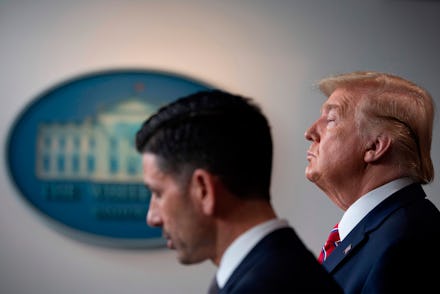The Trump administration is still trying to end DACA

Just a month after the Supreme Court ruled that the Deferred Action for Childhood Arrivals (DACA) immigration program should remain intact, the Trump administration appears to be flagrantly defying the ruling. DACA shields undocumented immigrants who arrived to the U.S. as children from deportation proceedings, permitting them to work legally and continue their lives without fear of retribution.
Acting Homeland Security Secretary Chad Wolf made the announcement earlier this week, warning that his department will "consider the future of the DACA policy," including possibly once again attempting to dismantle the program entirely. The statement does say that the administration will make immediate changes to DACA, including rejecting new requests and limiting renewed protections for current recipients to one year instead of two.
The announcement seemingly contradicts the Supreme Court's June ruling but capitalizes on an issue the justices did not resolve: the actual legality of the program. SCOTUS said that program's creation under DHS was not unconstitutional, but that its legality was up to the judgment of a different branch of government. "Whether DACA is illegal is, of course, a legal determination, and therefore a question for the attorney general," the majority opinion stated. The high court additionally only ruled specifically that the Trump administration had failed to offer an adequate reason for ending the program, but did not shield DACA from future attempts to end it.
This gray area is where DHS and Wolf feel they have grounds for questioning the validity of the program. In proposing the changes to DACA this week, the Trump administration claims that the status of undocumented immigrants who arrived as children should really be dealt with by Congress rather than the White House. "As the department continues looking at the policy and considers future action, the fact remains that Congress should act on this matter," Wolf said in a release, adding that because lawmakers have failed for so long to successfully pass immigration reform, perhaps "rescinding DACA entirely may well create a more pressing need for Congress to decide whether it wants to address this issue."
In other words, it's essentially a roundabout, farcical game: We really want undocumented immigrants to be protected, the Trump administration is claiming, so we will rescind their current protections so that Congress might finally protect them through legislation, which they would've done already if they really wanted to.
The DHS release further suggests that protection from deportation for young undocumented immigrants should be "exercised rarely and only on a truly individualized, case-by-case basis," and says the program may send "mixed messages" about U.S. immigration enforcement. The mere existence of a relief program like DACA, DHS claims, may "encourage individuals to take a perilous journey to this country, needlessly endangering children."
When President Obama created the program in 2012 by executive action, he said the intent was that DACA would be "a temporary stopgap measure that lets us focus our resources wisely while giving a degree of relief and hope to talented, driven, patriotic young people." Homeland Security Secretary Janet Napolitano additionally said that immigration laws were “not designed to be blindly enforced without consideration given to the individual circumstances of each case." Moreover, she said, immigration laws are not intended to target and deport "productive young people to countries where they may not have lived or even speak the language. Discretion, which is used in so many other areas, is especially justified here."
The Trump administration has repeatedly attacked DACA, even as President Trump himself has waffled on the subject, sometimes expressing sympathy for the young undocumented people while other times calling for the program's termination. The administration first announced that it would move to "wind down" the program in 2017. But legal groups immediately sought to block the DHS ruling, and the case was eventually appealed to the Supreme Court, where it was argued in November 2019 and decided this June.
Just two weeks ago, a federal judge ruled that DHS was obligated to restore the program and continue to accept applications. But with this new announcement, the fate of hundreds of thousands of undocumented immigrants once again hangs in the balance.